These were six-year public-private partnerships where both the government and the contractors agreed to invest in rocket development and infrastructure required to compete in the National Security Space Launch program.
The plan from day one was to discontinue the LSAs with companies that did not win a National Security Space Launch procurement contract. Blue Origin and Northrop Grumman lost to ULA and SpaceX, which were selected in August 2020. The Space and Missile Systems Center confirmed in a statement to SpaceNews that the LSAs with Blue Origin and Northrop Grumman ended in Dec. 31, 2020.
From October 2018 through December 2020, Blue Origin was paid $255.5 million. The original six-year agreement was worth $500 million. Northrop Grumman got $531.7 million over that same period, nearly two-thirds of the total value of the LSA which was $792 million.
“All remaining development activity for the Blue Origin and Northrop Grumman LSA milestones was completed and submitted by Dec. 31, 2020,” SMC said.
In return for the investment, the Space Force will get limited rights to data and hardware the companies developed under the agreements. “These rights provide the government access to the technology developed under these agreements for future purposes, but also allows industry to apply these technologies to their own future developments.”
The LSAs supported the development of Blue Origin’s New Glenn rocket and Northrop Grumman’s OmegA. After being eliminated from the National Security Space Launch program, Northrop Grumman discontinued the development of OmegA but Blue Origin is pressing forward and said it plans to fly the vehicle in late 2021 and compete in the commercial launch market.



